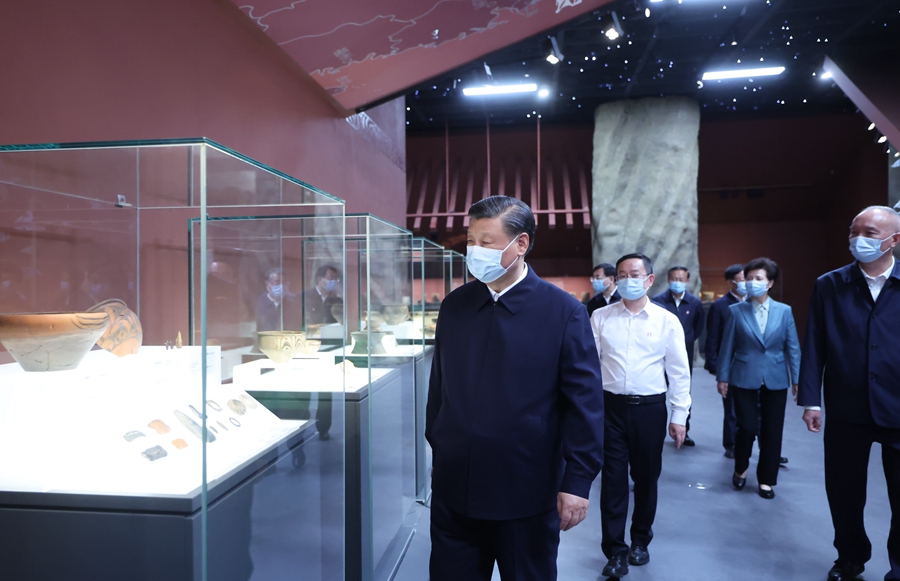


Chinese President Xi Jinping, also general secretary of the Communist Party of China Central Committee and chairman of the Central Military Commission, visits the Chinese Academy of History before a meeting on cultural inheritance and development in Beijing, capital of China, June 2, 2023. (Xinhua/Ju Peng)
BEIJING, June 3 (Xinhua) -- To the north of China's National Stadium, one can spot a building shaped like a traditional Chinese cauldron, or "ding." As indicated by its distinctive look, the building houses the Chinese Academy of History, one of the country's top institutions of historical research, which was established in January 2019.
Further north, the China National Archives of Publications and Culture (CNAPC) is situated at the foot of the Yanshan Mountains. Established in July 2022, the CNAPC is mainly in charge of the collection and preservation of Chinese publications of different eras and relevant data.
Chinese President Xi Jinping paid a visit to these two institutions on Thursday and Friday, demonstrating his unwavering commitment to the preservation and inheritance of Chinese culture.
At a subsequent meeting on cultural inheritance and development, Xi, also general secretary of the Communist Party of China Central Committee and chairman of the Central Military Commission, emphasized that a profound understanding of the history of Chinese civilization is essential to promoting the creative transformation and innovative development of fine traditional Chinese culture in a more effective manner.
"With unwavering cultural confidence, a profound sense of mission and a spirit of relentless endeavor, we must unite our efforts to create a new culture for our times," he said.
Just as Xi emphasized, a clear understanding of history is key to China's cultural development in present times. In this regard, both the institutions Xi visited bear paramount significance.
The CNAPC, for instance, is home to more than 25 million documents in various forms, including ancient classics, important publications as well as digital files.
The collection comprises invaluable documents that reflect China's historical and cultural development in profound ways. Several original volumes of the "Complete Library in Four Sections," or "Siku Quanshu," a collection of Chinese classical works compiled in the Qing Dynasty (1644-1911) are available here. Important modern publications such as "The Communist Manifesto" are also part of its collection. Therefore, the institution serves as a "seed bank" of Chinese civilization in many aspects.
Collecting historical documents has been a longstanding tradition deeply rooted in the Chinese nation. "In an era of national prosperity and social stability, we have the will and capacity to carry forward Chinese culture, and we should accomplish this great undertaking well," said Xi during his Thursday visit of the CNAPC.
The Chinese Academy of History, a subsidiary institution of the Chinese Academy of Social Sciences, focuses on the research and study of history, and its main duties include organizing and guiding the country's efforts in historical research, and implementing major national academic projects on the study of history.
Since its establishment, the academy has undertaken important historical projects, such as launching the compilation of the new general history of China, constructing the Revitalization Library, and conducting research on tracing the origins of Chinese civilization.
During his visit to the institution, Xi walked into the Chinese Archaeological Museum in the academy and watched the exhibitions on display.
As the country's first national archaeological museum, it boasts precious cultural relics from the Paleolithic period to modern times, highlighting the evolution of Chinese civilization of more than 5,000 years.
During the visit, Xi expressed hopes that scholars will continue to enhance their research endeavors and contribute their wisdom and efforts to the advancement of Chinese modernization.
On multiple occasions, Xi has stressed the importance of studying history and asked Party members to have a historical perspective.
"If one does not learn about China from the continuity of its long history, there is no way to understand ancient China, nor is it possible to understand modern China, let alone China in the future," Xi said at Friday's meeting.